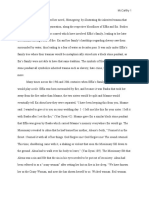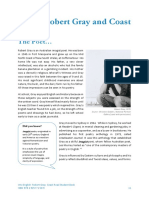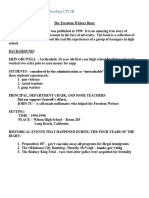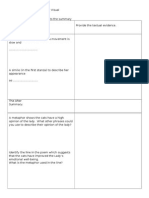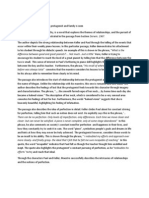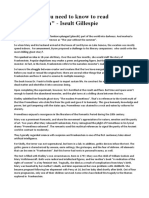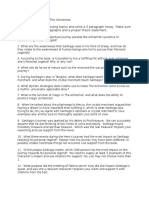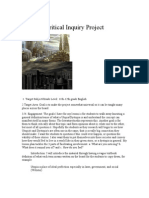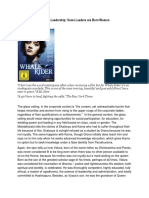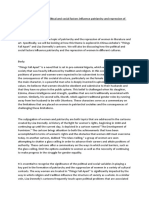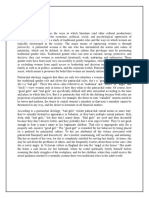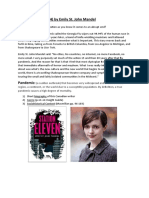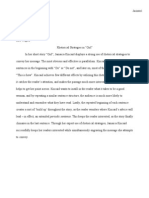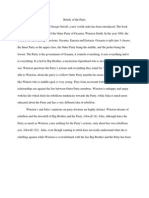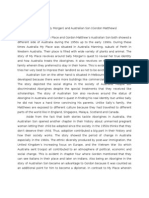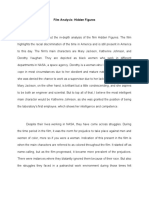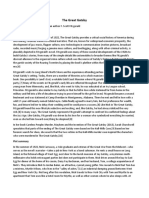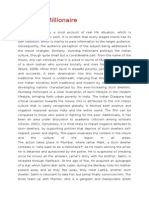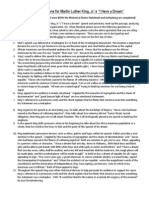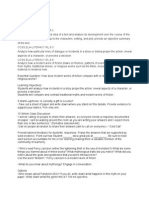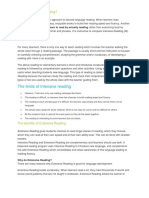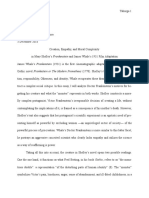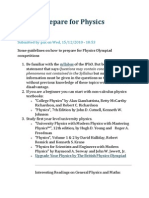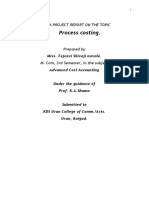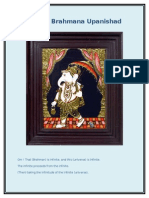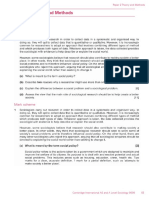The Alchemist
The Alchemist
Uploaded by
Vijay Kumar JaglanOriginal Description:
Copyright
Available Formats
Share this document
Did you find this document useful?
Is this content inappropriate?
Report this DocumentCopyright:
Available Formats
The Alchemist
The Alchemist
Uploaded by
Vijay Kumar JaglanCopyright:
Available Formats
THE ALCHEMIST - PAULO COELHO
QUESTIONS AND ANSWERS:QUES: 1:-How does the story of Narcissus relate to the broader message of The Alchemist?
ANS: The myth of Narcissus usually ends when Narcissus becomes so thoroughly entranced by his own reflection that he falls in the lake and drowns. In the novels version of the myth, however, we learn that the lake felt upset because Narcissus died, since it enjoyed looking at its own reflection in Narcissuss eyes. This version of the myth presents a more complicated picture of vanity than the original. As opposed to being an undesirable trait that leads to death, vanity appears to be an entirely natural characteristic, so much so that the lake displays it. Like the introductory Narcissus story, The Alchemist itself has a message that focusing on oneself can connect a person to nature and the spiritual world. Only through single-mindedly pursuing his own Personal Legend does Santiago learn the secrets of the Soul of the World, for instance. Throughout the book, Santiago must put his own interests first repeatedly, as when he chooses to be a shepherd rather than a priest and when he leaves the oasis to continue on his journey. But through disregarding everything but his own dream, Santiago realizes his true potential. In this way, he penetrates to the Soul of the World. QUES: 2:- What attitude does The Alchemist take toward romantic love? ANS: Unlike many popular literary tales, The Alchemist initially presents love not as a goal, but as an obstacle. Santiago says his initial love of the merchants daughter acts as the only thing that makes him want to stay in one place forever. This desire stands in direct opposition to the journey he must complete in order to fulfill his Personal Legend. When Santiago finds his true love, Fatima, in the oasis, he feels even more convinced to abandon his Personal Legend. Fatima and the alchemist must show Santiago that his dream holds more importance than staying with her. This picture of love is unique compared to traditional illustrations of romantic love. For one, this love is completely distinct from possession. Santiago has a significant internal dialogue about this distinction, and he puts it to the test when he leaves Fatima. Love, in The Alchemist, is also secondary to pursuing ones Personal Legend. As the alchemist tells Santiago, Santiagos love for Fatima will only survive if he continues living out his Personal Legend so that he will have no regrets later. Despite these facts, which seem to downplay the importance of love, Fatimas kiss serves as the final image of the book, suggesting that love remains necessary for Santiago to live a contented life.
QUES: 3:- What is the attitude of The Alchemist towards material wealth and individualism, and how does it differ from major world religions in this regard? ANS: Unlike many religions, The Alchemist does not draw a distinction between the material and the spiritual world. The book also espouses individuality as a means for achieving the ultimate goals of creation. Additionally, elements of pantheism appear throughout the book. For one, Santiago communicates and finds omens in natural entities such as the desert and the wind. The alchemist says that these elements have Personal Legends just like humans do, and that they were also born from the Soul of the World. The alchemist also associates the process of purifying metal into gold with spiritual purification. The books dominant strain of evolutionary spirituality appears most clearly when Santiago tries to turn himself into the wind. In the context of the novel, when a natural element or individual pursues a Personal Legend, it will evolve into a higher state of being. The goal of creation consists of all nature, humans and inanimate objects included, undergoing this evolution until the universe achieves perfection. This philosophy differs from traditional spirituality in that it requires everything pursuing its individual dream to achieve this state rather than practicing selflessness. In fact, the novel even portrays religious characters that practice self-denial, such as the crystal merchant, as failures. QUES: 4: - What is the meaning of the alchemy? ANS:Alchemy, in which a base metal is transformed into a more valuable metal like gold, functions as the dominant symbol in The Alchemist and represents Santiagos journey to achieve his Personal Legend. The symbol also gives the novel its title. The Alchemist describes the process of turning base metal to gold as equivalent to the base metal realizing its Personal Legend. In the parlance of the book, the metal must rid itself of all impurities to achieve a higher evolutionary state. Similarly, Santiago must rid himself of impurities, such as his desire for his parents acceptance, his desire to live as a rich shepherd, and even his desire to live with Fatima, in order to realize his own Personal Legend and achieve a higher state. The way a person learns the craft of alchemy parallels the way in which a person achieves his Personal Legend. As the alchemist tells Santiago, although many tomes have been written about alchemy, these books only complicate the craft. In fact, all the secrets of alchemy exist on the small Emerald Tablet, and these secrets cannot be expressed in words. Likewise, no written instructions can guide a person to his Personal Legend. The person must follow his own instincts and the omens provided by the Soul of the World. The alchemist chooses Santiago as his pupil rather than the Englishman largely because Santiago does not depend on books and reason to understand the world. By listening to the Soul of the World, Santiago ultimately enters into communion with all of nature, including the wind and the sun, and he reaches a higher state of being. QUES: 5:- How do omens guide Santiago in his journey?
ANS: The motif of omens serves a dual purpose in The Alchemist. For one, omens offer Santiago guidance on his journey and reassure him that the Soul of the World has endorsed his journey. As Melchizedek explains, omens make up part of the Universal Language of the World, and if Santiago taps into this language he can always find the meaning in his environment. For example, when the stones Urim and Thummim drop from Santiagos pocket, Santiago chooses to consider the event an omen. In doing so, he continues to feel that the universe conspires to help him, and he finds meaning in the seemingly random event. In this way, the motif of omens reinforces the books theme of the unity of nature. Omens also serve to demonstrate Santiagos spiritual growth throughout the story. The omens that Santiago experiences grow in relevance from being small, limited events to important visions that affect many lives. The vision of the hawks and approaching armies that Santiago has in Al-Fayoum, for example, tells Santiago of an assault on the oasis that could lead to the deaths of hundreds. That his omens become more and more important signifies that Santiago is getting closer to understanding the pure Language of the World.
QUES: 6:- what is the meaning of Maktub? ANS: - Many of the characters that Santiago meets during his journey use the word Maktub, which as the crystal merchant explains, means it is written. The word typically appears just as Santiago is about to turn to a new chapter in his quest, usually by taking a big risk or abandoning a comfortable situation. It becomes a reassuring refrain for Santiago, because it reminds Santiago to see his actions in the context of fate. As Santiago learns, fate always cooperates with those in pursuit of their Personal Legends, so as long as he remains focused on his goal he can find comfort in the fact that his destiny has already been written in the history of the world. In addition, the repetition of Maktub reinforces the Biblical tone of The Alchemist. The word gives Santiagos story the universality and spiritual heft of a fable (much like the other capitalized terms that dominate the book, such as the Soul of the World and the Hand that wrote all). QUES:-7:- What do you understand by this quote "God exists wherever He is allowed to enter."? ANS:The secrets of the universe were once known to everyone. The reason they are unknown now is not because they are complicated, but rather because we, as humans, complicated them. Therefore, as this quote suggests, finding God or happiness is not always a matter of seeking Him out, but rather of listening to the language of the World. QUES: 8:- What symbols Santiago get from his sheeps? ANS: - Santiagos sheep symbolize the sort of existence lived by those who are completely blind to their Personal Legends. Santiago loves his sheep, but he also expresses thinly veiled disrespect
for them because of their animal desires for mere food and water. He thinks that his sheep do not appreciate all the wonderful lands that Santiago discovers during his travels. Also, in a disturbing image, he imagines that his sheep are so blindly trusting that he could kill them one by one without them noticing. These sheep symbolize the characters in the book like the baker and the crystal merchant who do not pursue their Personal Legends. Like the sheep, these characters content themselves with their material desires and social acceptance. Accordingly, they lose the ability to appreciate certain aspects of creation, and tend to miss out on many opportunities because of their limited perspectives. QUES:-9:- When Santiago is lost and alone in Tangiers, the owner of the crystal shop offers him a position at his shop. What does Santiago learn from his time at the crystal shop? ANS: - The owner of the crystal shop teaches Santiago that one of the principle things which endanger the pursuit of a dream is one's own fear of achieving it. The crystal shop owner wants to go to Mecca, but also fears that if he does so he might lose his reason for living. Up until that point, Santiago has only been acquainted with exterior interference with achieving one's dreams, such as being robbed. QUES: 10:- How do you think the style of The Alchemist affects its meaning? Ans: - The novel is written in a very plain style, using short declarative sentences and few modifiers such as adjectives and adverbs. The book also makes wide use capitalized terminology and magical situations such as visions and communication with the Wind, Desert, etc. These combined factors make the didactic thrust of the story apparent. By simplifying the psychology of the characters and featuring characters with no names (the Englishman, the Alchemist, etc.), the story takes on a more universal appeal.
You might also like
- Homegoing EssayDocument5 pagesHomegoing Essayapi-615884217Noch keine Bewertungen
- Robert Gray ContextDocument5 pagesRobert Gray ContextJack StrangerNoch keine Bewertungen
- GatekeepingJOP PDFDocument15 pagesGatekeepingJOP PDFڤوتري جنتايوNoch keine Bewertungen
- Freedom Writers StudyGuideCP12BDocument6 pagesFreedom Writers StudyGuideCP12BMartina BernieNoch keine Bewertungen
- Letters To AliceDocument2 pagesLetters To AliceYatharthNoch keine Bewertungen
- Book Report On The Pythagorean TheoremDocument7 pagesBook Report On The Pythagorean Theoremwrc089100% (1)
- The Importance of Being Earnest - EssayDocument3 pagesThe Importance of Being Earnest - EssayconniieeeeNoch keine Bewertungen
- Lady Feeding The Cats Initial AnalysisDocument3 pagesLady Feeding The Cats Initial Analysisapi-288431060100% (1)
- Maestro EssayDocument1 pageMaestro EssayumakemesmileXDNoch keine Bewertungen
- Antigone's Optimistic HeroismDocument6 pagesAntigone's Optimistic HeroismAssignmentLab.comNoch keine Bewertungen
- Persuasive Techniques WorksheetDocument2 pagesPersuasive Techniques WorksheetMs-Devashia T WhyteNoch keine Bewertungen
- Everything You Need To Know To Read FrankensteinDocument3 pagesEverything You Need To Know To Read FrankensteinmaribelvayaNoch keine Bewertungen
- 50 Super-Fun Math Activities Grade 6Document64 pages50 Super-Fun Math Activities Grade 66v9100% (1)
- Watteau's Chinese CabinetDocument61 pagesWatteau's Chinese CabinetJoe MagilNoch keine Bewertungen
- The AlchemistDocument5 pagesThe AlchemistDark nessNoch keine Bewertungen
- Extra Credit Essay For The AlchemistDocument1 pageExtra Credit Essay For The AlchemistHamza AliNoch keine Bewertungen
- Human DignityDocument28 pagesHuman DignityChenwie Mother of GodNoch keine Bewertungen
- To Kill A Mockingbird Passage AnalysisDocument1 pageTo Kill A Mockingbird Passage AnalysisMikeNoch keine Bewertungen
- Critical Inquiry Project: Utopia/ Dystopia Lesson PlanDocument3 pagesCritical Inquiry Project: Utopia/ Dystopia Lesson PlanShannon EvansNoch keine Bewertungen
- Introduction and Questions by ChaptersDocument21 pagesIntroduction and Questions by ChaptersMaría Vega QuirósNoch keine Bewertungen
- Life and Crimes of Harry Lavender EssayDocument4 pagesLife and Crimes of Harry Lavender EssayqwoneNoch keine Bewertungen
- Harry Lavender - Distinctive VoicesDocument34 pagesHarry Lavender - Distinctive VoicesRebecca Lasorsa100% (1)
- Whale RiderDocument28 pagesWhale RidersumitNoch keine Bewertungen
- Cancer Karp 16Document5 pagesCancer Karp 16Claudia Perez MestreNoch keine Bewertungen
- The Fault in Our Stars PaperDocument9 pagesThe Fault in Our Stars Paperapi-490173413Noch keine Bewertungen
- Lamb To The Slaughter Analysis CharacterDocument4 pagesLamb To The Slaughter Analysis CharacterAulia IndahNoch keine Bewertungen
- English IO ScriptDocument3 pagesEnglish IO ScriptAshrith SabhanamNoch keine Bewertungen
- Speeches SummaryDocument28 pagesSpeeches SummaryDaniel ClagueNoch keine Bewertungen
- Elysium Literary Elements WorksheetDocument1 pageElysium Literary Elements WorksheetHugh Fox IIINoch keine Bewertungen
- The Catcher in The Rye AnalysisDocument2 pagesThe Catcher in The Rye AnalysisAna Losada PérezNoch keine Bewertungen
- Feminism:-: Patriarchy. A Patriarchal Woman Is The One Who Has Internalized The Norms and Values ofDocument10 pagesFeminism:-: Patriarchy. A Patriarchal Woman Is The One Who Has Internalized The Norms and Values ofAmjad RazaNoch keine Bewertungen
- Ib English-On Keeping A Notebook DiscussionDocument2 pagesIb English-On Keeping A Notebook Discussionapi-525293444Noch keine Bewertungen
- Research PaperDocument22 pagesResearch Paperapi-334736022Noch keine Bewertungen
- White Patriarchal Capatalism EssayDocument8 pagesWhite Patriarchal Capatalism Essayapi-355203086Noch keine Bewertungen
- Catcher in The Rye Study Guide CH 5-8Document3 pagesCatcher in The Rye Study Guide CH 5-8Mrs. OrdwayNoch keine Bewertungen
- Initial Running Sheet On Station ElevenDocument10 pagesInitial Running Sheet On Station Elevenem marsNoch keine Bewertungen
- 'Girl' Jamaica Kincaid Rhtorical StragtegiesDocument1 page'Girl' Jamaica Kincaid Rhtorical Stragtegiesjdjacinto29Noch keine Bewertungen
- 1984 EssayDocument2 pages1984 EssayMP276Noch keine Bewertungen
- Magic RealismDocument2 pagesMagic RealismassignhelpNoch keine Bewertungen
- My Place and Australian SonDocument3 pagesMy Place and Australian SonLesly BriesNoch keine Bewertungen
- Film Analysis - 4 - Hidden FiguresDocument4 pagesFilm Analysis - 4 - Hidden FiguresNindo RELUCTANTNoch keine Bewertungen
- The Great Gatsby: Historical ContextDocument4 pagesThe Great Gatsby: Historical Contextgermanvip8Noch keine Bewertungen
- For One More Day Study Guide (Metro) Revised 12-07Document18 pagesFor One More Day Study Guide (Metro) Revised 12-07eihjay-bravo-8041Noch keine Bewertungen
- DollsHouse NotesDocument5 pagesDollsHouse NotesAjneya .LNoch keine Bewertungen
- TOK EssayDocument7 pagesTOK EssayAngela GarzaNoch keine Bewertungen
- Elysium (2013) - IMDbDocument1 pageElysium (2013) - IMDbnewbie_101Noch keine Bewertungen
- Slumdog MillionaireDocument4 pagesSlumdog MillionaireTika ShantiNoch keine Bewertungen
- The Crucible Extra CreditDocument1 pageThe Crucible Extra CreditMrs. PNoch keine Bewertungen
- MLK JR I Have A Dream Analysis QuestionsDocument2 pagesMLK JR I Have A Dream Analysis Questionsapi-256026526100% (1)
- Society and CultureDocument17 pagesSociety and CultureJamion Knight75% (4)
- 1984 EssayDocument3 pages1984 EssayaridamkumarNoch keine Bewertungen
- Mythology Unit Lessons 1-4Document9 pagesMythology Unit Lessons 1-4api-240550716Noch keine Bewertungen
- My Antonia EssayDocument5 pagesMy Antonia Essayapi-300849514Noch keine Bewertungen
- Writing Effective Topic SentencesDocument3 pagesWriting Effective Topic SentencesDerrith DunnNoch keine Bewertungen
- Past Paper October 2018 Section 1Document32 pagesPast Paper October 2018 Section 1Pakorn WinayanuwattikunNoch keine Bewertungen
- Idealism&RealismDocument4 pagesIdealism&RealismAshNoch keine Bewertungen
- Poststructuralism (Derrida and Foucault)Document4 pagesPoststructuralism (Derrida and Foucault)ROUSHAN SINGHNoch keine Bewertungen
- Romeo and Juliet EssayDocument2 pagesRomeo and Juliet Essayapi-189467016Noch keine Bewertungen
- Early Civilizations of The Americas: Chapter PreviewDocument26 pagesEarly Civilizations of The Americas: Chapter PreviewJazmin Rico0% (1)
- Langston HughesDocument3 pagesLangston HughesDushyant NimavatNoch keine Bewertungen
- LTL - Group 1 - Alchemist - Report PDFDocument10 pagesLTL - Group 1 - Alchemist - Report PDFGautam GirmeNoch keine Bewertungen
- Major Themes - The AlchemistDocument3 pagesMajor Themes - The AlchemistAman Arora100% (1)
- The Alchemist - Summarized for Busy People: Based on the Book by Paulo CoelhoFrom EverandThe Alchemist - Summarized for Busy People: Based on the Book by Paulo CoelhoRating: 4 out of 5 stars4/5 (1)
- Cooperative Societies in Nigeria: Prospects and ProblemsDocument6 pagesCooperative Societies in Nigeria: Prospects and ProblemsBasavarajBusnurNoch keine Bewertungen
- Extensive 4Document2 pagesExtensive 4AadNoch keine Bewertungen
- The Art of Principled Negotiation: A Professional Approach To MediationDocument5 pagesThe Art of Principled Negotiation: A Professional Approach To MediationOladayo IfeoluwaseNoch keine Bewertungen
- Electric Circuit Problems With SolutionsDocument6 pagesElectric Circuit Problems With SolutionsCharles RitterNoch keine Bewertungen
- Functions Sequences, Sums, Countability: Zeph GrunschlagDocument61 pagesFunctions Sequences, Sums, Countability: Zeph GrunschlagChandra Sekhar DNoch keine Bewertungen
- Botting, in His Book Gothic, RefeDocument9 pagesBotting, in His Book Gothic, RefeDanielOrdoñezNoch keine Bewertungen
- How To Prepare For Physics OlympiadDocument3 pagesHow To Prepare For Physics OlympiadShrikant Kumar50% (2)
- Transfer of TrainednessDocument2 pagesTransfer of Trainednessmakijato954649Noch keine Bewertungen
- Parking TorquesDocument17 pagesParking TorquesIlijaBošković100% (1)
- Process Costing.: A Project Report On The TopicDocument37 pagesProcess Costing.: A Project Report On The Topicsaqib25492Noch keine Bewertungen
- Trisikhi Brahmana UpanishadDocument7 pagesTrisikhi Brahmana Upanishadloshude100% (1)
- Learn Tarot - A Steps by Step GuidebyJulian de BurghDocument146 pagesLearn Tarot - A Steps by Step GuidebyJulian de Burghvishala1211Noch keine Bewertungen
- BOPPPS Session Plan - Respect For DiversityDocument2 pagesBOPPPS Session Plan - Respect For DiversityMoreno MontenegroNoch keine Bewertungen
- Sosc1 ClippingsDocument17 pagesSosc1 ClippingsSheena Salva QuilangNoch keine Bewertungen
- Patrick's Negative PlatonismusDocument11 pagesPatrick's Negative PlatonismusBlaNoch keine Bewertungen
- Submitted By-Bhavya Bhandari, Ayush Sharma & Amit Singh TomarDocument3 pagesSubmitted By-Bhavya Bhandari, Ayush Sharma & Amit Singh TomarAmit Singh TomarNoch keine Bewertungen
- 40 Ways To Make Yourself HappierDocument10 pages40 Ways To Make Yourself HappierAdam WilliamsonNoch keine Bewertungen
- The Lotus in The MudDocument3 pagesThe Lotus in The Mudlnln462lnNoch keine Bewertungen
- ACF Community Nutrition GuideDocument170 pagesACF Community Nutrition GuideAction Against Hunger USA100% (1)
- Watch For Signs A Thesis On The Book of RevelationDocument133 pagesWatch For Signs A Thesis On The Book of RevelationTiranraxNoch keine Bewertungen
- Section A: Paper 2 Theory and MethodsDocument40 pagesSection A: Paper 2 Theory and MethodsTáłhã QasimNoch keine Bewertungen
- Educ 15Document8 pagesEduc 15Rexson Dela Cruz TagubaNoch keine Bewertungen
- Touchstone TarotDocument203 pagesTouchstone TarotAnastasia Koukouvitaki89% (9)
- Fact and Opinion + Cause and EffectDocument30 pagesFact and Opinion + Cause and EffectBianca NapoleoniNoch keine Bewertungen
- IIED ICT FINAL Project ReportDocument18 pagesIIED ICT FINAL Project ReportVitesh ShankarNoch keine Bewertungen
- HRM at GoogleDocument11 pagesHRM at GoogleDashmesh ChadhaNoch keine Bewertungen
- 4 VAK-answer SheetDocument2 pages4 VAK-answer SheetLOLONoch keine Bewertungen
